
Bill Haley & His Comets was an American rock and roll band formed in 1947 and continuing until Haley's death in 1981. The band was also known as Bill Haley and the Comets and Bill Haley's Comets. From late 1954 to late 1956, the group recorded nine Top 20 singles, one of which was number one and three that were Top Ten. The single "Rock Around the Clock" was the best-selling rock single in the history of the genre and maintained that position for several years.
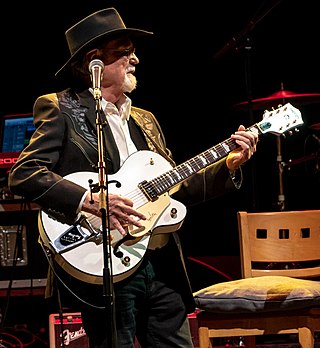
Duane Eddy was an American rock and roll guitarist. In the late 1950s and early 1960s, he had a string of hit records produced by Lee Hazlewood which were noted for their characteristically "twangy" guitar sound, including "Rebel-'Rouser", "Peter Gunn", and "Because They're Young". He had sold 12 million records by 1963. His guitar style influenced the Shadows, the Beatles and Bruce Springsteen.
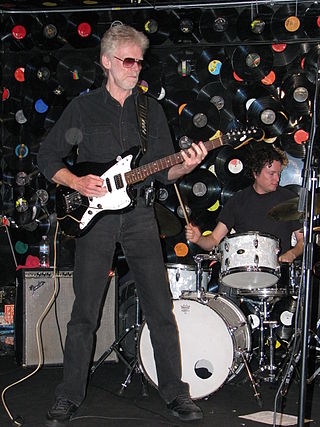
Davie Allan is an American guitarist best known for his work on soundtracks to various teen and biker movies in the 1960s. Allan's backing band is almost always the Arrows, although the Arrows have never had a stable lineup.

Fred Lincoln "Link" Wray Jr. was an American guitarist, songwriter, and vocalist who became popular in the late 1950s. His 1958 instrumental single "Rumble", reached the top 20 in the United States; and was one of the earliest songs in rock music to utilize distortion and tremolo.
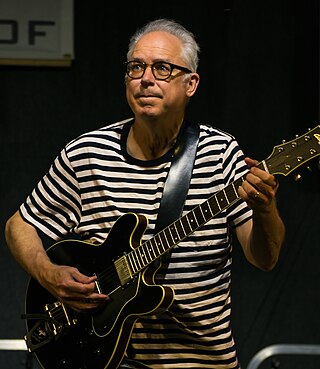
William Richard Frisell is an American jazz guitarist. He first came to prominence at ECM Records in the 1980s, as both a session player and a leader. He went on to work in a variety of contexts, notably as a participant in the Downtown Scene in New York City, where he formed a long working relationship with composer and saxophonist John Zorn. He was also a longtime member of veteran drummer Paul Motian's groups from the early 1980s until Motian's death in 2011. Since the late 1990s, Frisell's output as a bandleader has also integrated prominent elements of folk, country, rock ‘n’ roll and Americana. He has six Grammy nominations and one win.

The Atlantics are an Australian surf band founded in 1961. Initially, the band line-up consisted of drummer Peter Hood, bassist Bosco Bosanac, Theo Penglis on lead and rhythm guitar, and guitarist Eddy Matzenik. Matzenik was replaced by Jim Skaithitis while the band was still in its earliest stages, long before the band recorded or released albums. The band's claim to fame was as Australia's most successful of the genre. Most well known for their classic hit, "Bombora", their later recordings such as "Come On" are examples of 1960s garage rock. They were the first Australian rock band to write their own hits. In 2000 the group reformed with three of the original members, and continue to release new material and perform in concert. In 2013 the group celebrated the 50th Anniversary of their first album, Bombora and the eponymous single that was their first to chart. A European tour was organised to mark the occasion.

The Ventures are an American instrumental rock band formed in Tacoma, Washington, in 1958, by Don Wilson and Bob Bogle. The band, which was a quartet for most of its existence, helped to popularize the electric guitar across the world during the 1960s. While their popularity in the United States waned in the 1970s, the group remains especially revered in Japan, where they have toured regularly. The classic lineup of the band consisted of Wilson, Bogle, Nokie Edwards, and Mel Taylor (drums).

Paul Revere & the Raiders were an American rock band formed in Boise, Idaho, in 1958. They saw considerable U.S. mainstream success in the second half of the 1960s and early 1970s. The band was known for including Revolutionary War-style clothes in their attire.
Archibald Martin Bleyer was an American song arranger, bandleader, and record company executive.

Guitar Wolf is a Japanese garage rock power trio founded in Tokyo in 1987. They coined the phrase "jet rock 'n' roll", which they use to describe their musical style. The band is signed to Sony Music Japan's Ki/oon Records division.

Francis Eugene Beecher was the lead guitarist for Bill Haley & His Comets from 1954 to 1962, and is best remembered for his innovative guitar solos combining elements of country music and jazz. He composed the classics "Blue Comet Blues", "Goofin' Around", "Week End", "The Catwalk", and "Shaky" when he was the lead guitarist for Bill Haley and the Comets. He continued to perform with surviving members of the Comets into 2006. In 2012, the Rock and Roll Hall of Fame inducted Beecher as a member of the Comets by a special committee, aimed at correcting the previous mistake of not inducting the Comets with Bill Haley.
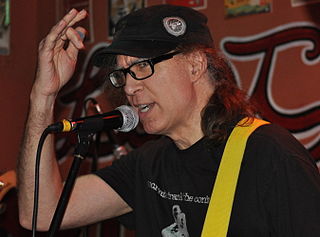
Jack Endino is an American producer and musician based in Seattle, Washington. Long associated with Seattle label Sub Pop and the grunge movement, Endino worked on seminal albums from bands including Mudhoney, Soundgarden and Nirvana. He was also the guitarist for Seattle band Skin Yard, which was active between 1985 and 1992. Endino currently manages a studio in Seattle called Soundhouse, owned by Mike Sebring.
Dennis James Coffey is an American guitarist. He was a studio musician for many soul and R&B recordings, and is well known for his 1971 Top 10 hit single "Scorpio".

"Rock Me Baby" is a blues standard that has become one of the most recorded blues songs of all time. It originated as "Rockin' and Rollin'", a 1951 song by Lil' Son Jackson, itself inspired by earlier blues. Renditions by Muddy Waters and B.B. King made the song well-known. When B.B. King's recording of "Rock Me Baby" was released in 1964, it became his first single to reach the Top 40 in Billboard magazine's Hot 100 chart.

"Raunchy" is an instrumental by American rock and roll artist Bill Justis, co-written with Sidney Manker and produced by Sam Phillips. The tune, from the album Cloud 9, was released as a single on the record label Phillips International Records, a sub-label of Sun Records, on September 23, 1957.
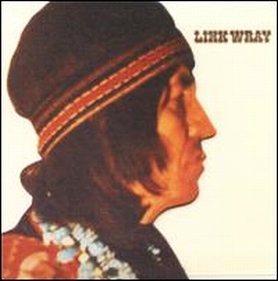
Link Wray is the 1971 album by pioneering guitarist Link Wray. The music is an Americana blend of blues, country, gospel, and folk rock elements. This music is characterized by the purposeful use of simplified sounds to reflect the then-current vogue of blues and other roots music being used in many roots rock bands. Wray's guitar-work, composing, and vocals reflected modern rock influences. Despite publicity from radio stations and print media in the Washington, D.C. area, the album did not do well in national sales.

Beans and Fatback is a 1973 album by American guitarist Link Wray. It was recorded in 1971 by Link's brother Vernon "Ray Vernon" Wray at Wray's Shack Three Track studio, an old chicken shack on Wray's farm in Accokeek, Maryland during the Link Wray/Mordicai Jones sessions. It was mixed by Simon Heyworth at The Manor Studio, Oxfordshire, England. The music is similar to other of Wray's period recordings with distinctive "shack" sound and the same Americana blend of blues, country, gospel, and folk rock, but it is a slightly looser and harder-rocking set than Link Wray.

Rock 'n Roll Stage Show is the first studio album and fourth overall album by rock and roll band Bill Haley and His Comets. Released by Decca Records in August 1956, it was the group's first album to include new, as opposed to previously released material. Although the album spawned several singles, it also featured several album-only tracks.
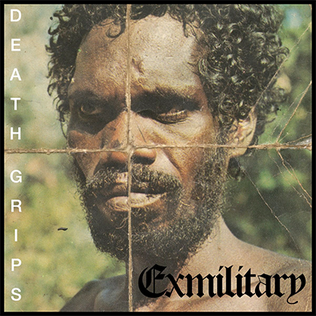
Exmilitary, also known as Ex Military, is the debut mixtape by experimental hip hop group Death Grips. It was released for free on April 25, 2011, through the band's website.

Guitar in the Space Age! is an album by Bill Frisell featuring interpretations of songs and instrumentals from the 1960s which was released by OKeh in 2014.


















